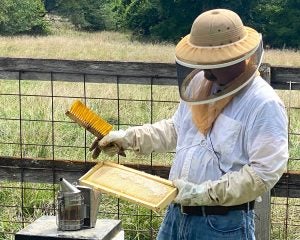Is cooperative extension the answer to your problems on the farm or in your rural community?
You’ve probably heard the term “extension” when it comes to academia, but what is it exactly and what do extension agents do?
Coming from a city-girl background, I wasn’t especially familiar with these types of programs when I entered rural America, but I now utilize them all the time as an excellent resource for assistance and knowledge! They are a group of helpful and trained experts right at your fingertips, and they can assist with both agriculture folks and the general public. Let’s break it down:
Have a lawn- or farm-related problem or a pressing question in need of an answer? Extension programs can help! Every state in the U.S. has a local service called the Cooperative Extension Service. This operation was first formalized by the U.S. government in 1914 with the passing of the Smith-Lever Act, instituting an extension service at land-grant universities across the nation. Extension services aim to provide research-backed information to problems you may be facing in the three core program areas:
- Agriculture/horticulture
- Family and consumer sciences
- 4-H youth development
Extension services originally focused on agriculture-centered programs, and this drives much of the work they continue to do today. Farmers and ranchers can guarantee that their local extension office will provide science-backed information to them on a variety of topics like weed and pest control, livestock management protocols, running a business, and so much more! Since its creation the Cooperative Extension Service has expanded well beyond the reach of just agriculture. Now it provides homeowners with information for their lawns and gardens; like what to plant, when to plant, when to harvest, how to irrigate and fertilize — again all with information that comes from research.
Think of it as having both unchanging and changing aspects: Extension is always a steadfast and valuable resource, but also one that adapts with the times and technology of the era.

Family and consumer science programs go inside the home, where they have information on food safety and preparation, family relationships, mental health, even financial management and tax preparation services, among other topics. The youth development program of extension is what most are familiar with: 4-H clubs. 4-H clubs can be offered in and out of school on a wide range of topics and aren’t always just related to livestock showing; some fun ones I have seen include robotics clubs, gardening, dog training, and art clubs. 4-H specializes in preparing kids to be well-rounded adults and allows them to learn & thrive in a safe, structured environment.
Extension is connected directly to universities, and extension agents/educators are typically faculty and staff members of your state’s land-grant university system. Every state is a little different in its operations: Some have county offices, some operate on a multi-county basis, and some are more regionally centered (each state has website for its extension programs, including an office locator).
Although each structure is different, the agent/educator’s role is the same. University researchers study topics that are important to industries like agriculture but also topics that are important to the general public. Agents/educators then take the research data and convert it into usable products and information for the public. They do this by offering free or low-cost workshops, providing services such as field visits and office consultations, and these days, by putting a lot of resources online. Extension also plays a role in the adoption of new techniques and technology in the outlined program areas, ensuring the development of social, economic, and environmental goals.

So, what does all of this mean for you? Basically, there is someone located close to you just waiting to provide an answer to your question! You may be surprised of all the possibilities your local extension office can offer. Whether you’ve been farming for generations, just starting to open a new agriculture business, or simply want to plant a small garden, there is an extension agent just for you!
First you’ll need to find which university your state’s extension service is linked to (you can do that here). Then simply type in the university name along with extension (for example, University of Florida Extension) into a search engine. Alternatively, you can search for your county and state name along with extension to find your local county office. You can even ask questions online and get responses from extension services across the nation on the Ask Extension website!
Extension agents/educators across the United States are helping their clientele. Will you be next?
Michelle Miller, the Farm Babe, is a farmer, public speaker and writer who has worked for years with row crops, beef cattle, and sheep. She believes education is key in bridging the gap between farmers and consumers.



